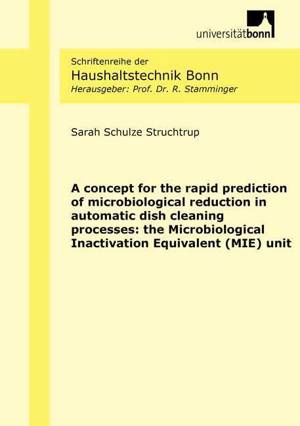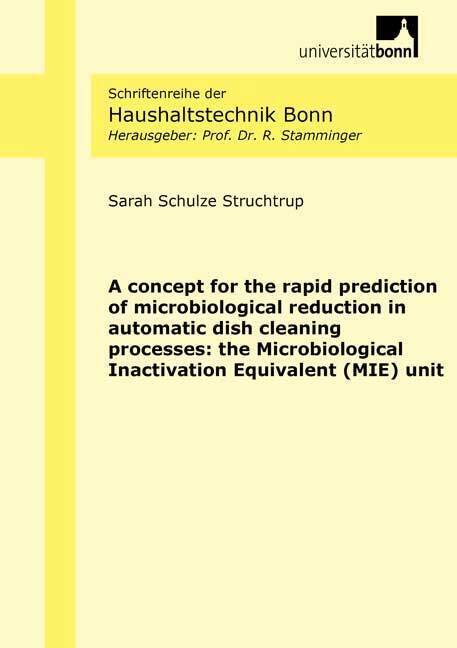
- Afhalen na 1 uur in een winkel met voorraad
- Gratis thuislevering in België vanaf € 30
- Ruim aanbod met 7 miljoen producten
- Afhalen na 1 uur in een winkel met voorraad
- Gratis thuislevering in België vanaf € 30
- Ruim aanbod met 7 miljoen producten
Zoeken
A concept for the rapid prediction of microbiological reduction in automatic dish cleaning processes: the Microbiological Inactivation Equivalent (MIE) unit
Dissertationsschrift
Sarah Schulze Struchtrup
€ 45,45
+ 90 punten
Omschrijving
The dishwasher is an excellent means to clean contaminated food-contact items and contributes essentially to kitchen hygiene. Today there is no evidence of insufficient hygiene in automatic dishwashing. However, future developments like decreasing temperatures, reduced water consumption and changes in chemistry might increase the risk of an inadequate reduction of microorganisms. Microbiological tests with inoculated test items used to determine the microbial reduction caused by a dishwashing process are labour-intensive and time-consuming. Consequently, there is a need to accelerate and simplify the assessment of microbial reduction in dish cleaning processes.
The aim of this study was to assess the microbial reduction of a dish cleaning process only by using physical parameters of a given process (time and temperature) together with microorganism-specific inactivation parameters. The 'Microbiological Inactivation Equivalent (MIE) unit' representing the time-temperature integral of a dish cleaning process for a specific microorganism was developed. Microbial reduction in suspension and dishwasher tests was tested in parallel. The microorganism-specific inactivation parameters were adjusted by fitting the MIE units to the experimental reduction factors.
As representative test strains M. luteus and Ent. faecium were identified. The mean squared error between reduction factors and MIE units calculated in suspension tests was on average < 1 (Ent. faecium: 0.87, M. luteus: 0.79) and in dishwasher tests about 1 (Ent. faecium: 1.09, M. luteus: 1.03). In conclusion, the MIE concept can be used as a simple and rapid method to predict the microbial reduction of a dish cleaning process under well-defined conditions.
The aim of this study was to assess the microbial reduction of a dish cleaning process only by using physical parameters of a given process (time and temperature) together with microorganism-specific inactivation parameters. The 'Microbiological Inactivation Equivalent (MIE) unit' representing the time-temperature integral of a dish cleaning process for a specific microorganism was developed. Microbial reduction in suspension and dishwasher tests was tested in parallel. The microorganism-specific inactivation parameters were adjusted by fitting the MIE units to the experimental reduction factors.
As representative test strains M. luteus and Ent. faecium were identified. The mean squared error between reduction factors and MIE units calculated in suspension tests was on average < 1 (Ent. faecium: 0.87, M. luteus: 0.79) and in dishwasher tests about 1 (Ent. faecium: 1.09, M. luteus: 1.03). In conclusion, the MIE concept can be used as a simple and rapid method to predict the microbial reduction of a dish cleaning process under well-defined conditions.
Specificaties
Betrokkenen
- Auteur(s):
- Uitgeverij:
Inhoud
- Aantal bladzijden:
- 126
- Taal:
- Engels
- Reeks:
Eigenschappen
- Productcode (EAN):
- 9783844078756
- Uitvoering:
- Paperback
- Afmetingen:
- 172 mm x 8 mm
- Gewicht:
- 189 g

Alleen bij Standaard Boekhandel
+ 90 punten op je klantenkaart van Standaard Boekhandel
Beoordelingen
We publiceren alleen reviews die voldoen aan de voorwaarden voor reviews. Bekijk onze voorwaarden voor reviews.











